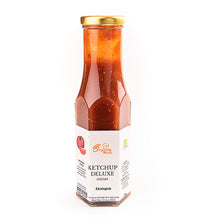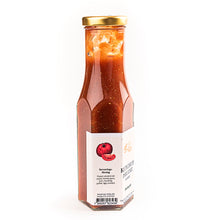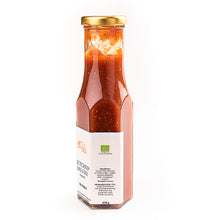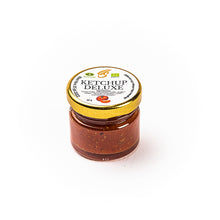
A more luxurious aromatic tasty tomato ketchup made from sun-ripened, juicy organic Italian tomatoes, the highest quality ingredients, a real hit for real ketchup lovers.
This classic ketchup has a sweet and slightly spicy taste of tomatoes and works as the perfect flavor enhancer or as an accompaniment to various meals. It is perfect for everything from sauces to pasta, as a dip for meat and bread or as a flavor enhancer in marinades and sauces - your imagination sets the limits.
"Ketchup is a condiment that comes in many varieties. Tomato ketchup is common in Europe and the United States, but there are also others such as walnut ketchup, mushroom ketchup, anchovy ketchup, oyster ketchup and mango ketchup. Around 2011, the United States had the most ketchup varieties. At the same time, most ketchup in the world per person and year in Sweden (read 2011)" (Wikipedia)
"Classic ketchup is a dynamic red concoction. At once savory and sweet, with just the right amount of acidity, it is poured and sprinkled on our favorite dishes.
In the US, 97 percent of households report having a bottle at the table. How did a simple sauce become so loved? It turns out that ketchup's origins are anything but American. Ketchup comes from the Chinese Hokkien word, kê-tsiap, the name of a sauce derived from fermented fish. It is believed that traders brought fish sauce from Vietnam to Southeast China.
The British likely encountered ketchup in Southeast Asia, returned home and attempted to replicate the fermented dark sauce. This probably happened in the late 17th and early 18th centuries, as evidenced by a recipe published in 1732 for "Ketchup in Paste" by Richard Bradley, which referred to "Bencoulin in the East Indies" as its origin.
But this was certainly not the ketchup that we would recognize today. Most British recipes called for ingredients such as mushrooms, walnuts, oysters or anchovies in an attempt to reproduce the savory flavors first encountered in Asia. Mushroom ketchup was even a claimed favorite of Jane Austen. These early ketchups were mostly thin and dark and were often added to soups, sauces, meat and fish. At this point, ketchup was missing an important ingredient.
The first known published recipe for tomato ketchup appeared in 1812, written by scientist and horticulturist James Mease, who called tomatoes "love apples." His recipe included tomato paste, spices and brandy but lacked vinegar and sugar.
Ketchup's success was partly due to the fact that it could be stored for up to a year. Still, preserving tomato ketchup proved challenging. Because the tomato growing season was short, ketchup makers had to solve the problem of preserving tomato pulp year-round. Some manufacturers handled and stored the product so poorly that the resulting sauce contained impurities such as bacteria, spores, yeast, and mold—leading French cookbook author Pierre Blot to call commercial ketchup "disgusting, decomposed, and rotten" in 1866.
Wiley partnered with a man from Pittsburgh named Henry J. Heinz who had started producing ketchup in 1876. Heinz was also convinced that American consumers did not want chemicals in their ketchup. In response to the benzoate controversy, Heinz developed a recipe that used ripe red tomatoes—which have more of the natural preservative called pectin than the residues other manufacturers used—and dramatically increased the amount of vinegar and to reduce the risk of spoilage. Heinz began producing preservative-free ketchup and soon dominated the market. By 1905 the company had sold five million bottles of ketchup.” (National Geographic)
Perfect for grilled meat, sausages, marinades, pasta
Ingredients: Tomato*(73%), raw cane sugar*(14%), vinegar*, red onion*, sea salt, mustard seed*, garlic*, black pepper*, spices* *Organic ingredients
Nutrition declaration 100g: Energy 334 kJ/80 kcal; Fat 0.2 g (saturated fat 0 g); Carbohydrates 19 g (sugars 18 g); Protein 1 g; Salt 1 g















